
From Ukraine peace plans to Kazakh uranium—all that and more in our new nuclear digest
Our November Nuclear Digest by Bellona’s Environmental Transparency Center is out now. Here’s a quick taste of just three nuclear issues arising in U...
News
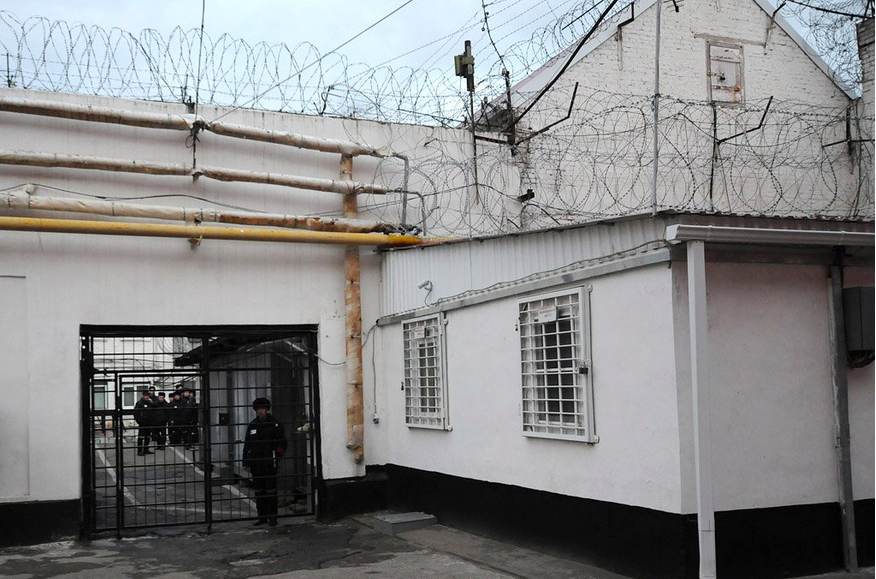
Publish date: February 21, 2014
News
Yevgeny Vitishko, the jailed environmentalist who has vocally opposed the metastasis of ecological disaster in the wake of the Sochi Olympics build-out, has finally been located and seen by a prisoners’ advocacy group and one of his lawyers after he dropped off the map during a jail transfer four days ago.
He finally turned up in a jail in Krasnodar – the capital of the region hosting the Olympics – in a cell block designated for “especially dangerous criminals,” his Krasnodar-based council Maria Dubrovina said late today, finally meeting him after standing for four days in various lines at the jail trying to locate him. The cell block in which Vitishko is being held is guarded by members of Russia’s special military forces, as opposed to regular prison guards.
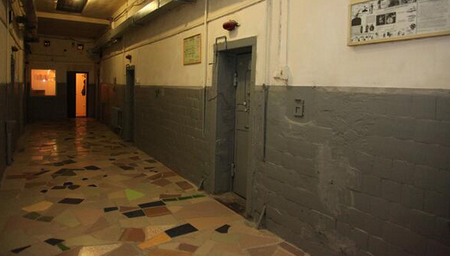
Dubrovina also reported that Vitishko is seriously ill. He has developed a hacking cough and has not been allowed to see a doctor, nor even allowed to take any medicine. His cell is fitted with a loud radio that cannot be turned off between the hours of 6 am and 10 pm, belching news from one of Russia’s official news stations. Activity in his cell is constantly recorded via camera and audio listening devices.
Vitishko was supposed to begin serving a three-year sentence in a general population penal colony this week after a 15-day period of administrative incarceration for supposedly swearing in pubic in his hometown of Tuapse – 120 kilometers Northwest Sochi – expired on February 18.
But instead of being turned loose from the Tuapse jail to say goodbye to his wife Larisa and his two sons, and to collect his personal affects before turning himself over penal colony officials, as was ordered by the court, the 40-year-old geologist disappeared.
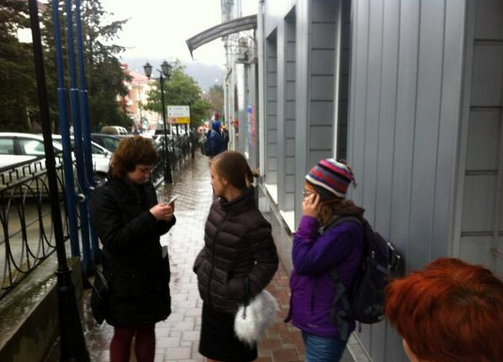
It was not confirmed until late yesterday afternoon by Anna Mitrenko of the Public Monitoring Committee, a prisoners’ rights group affiliated with the Presidential Council for Human Rights, that Vitishko had instead been transferred from the Tuapse jail to Remand Jail No 1 in Krasnodar.
Mitrenko told Bellona by telephone that she had located and visited Vitishko in the Krasnodar jail, and that he was located in a two-person cell and still suffering from a bad cold he contracted while in detention in Tuapse’s tumble-down, Russian revolution-era jail.
She said he had ended a hunger strike he began on February 12, the day he his appeal against the three-year prison colony sentence for supposedly spray-painting on a construction fence located in a protected forest was turned down.
Numerous activists and Norwegian TV2’s Øystein Bogen had been on hand to see Vitishko upon his schedule release in Tuapse on February 18 at 1:20 pm local time. All were turned away as early afternoon became evening, without explanation from local jail officials.
Mitrenko and Dubrovina thus ended a three-and-a half-day search joined by Vitishko’s other lawyer, Alexander Popkov, and Vitishko’s fellow activists at the Environmental Watch on the North Caucasus, during which time jail officials in both towns refused to disclose Vitishko’s whereabouts.
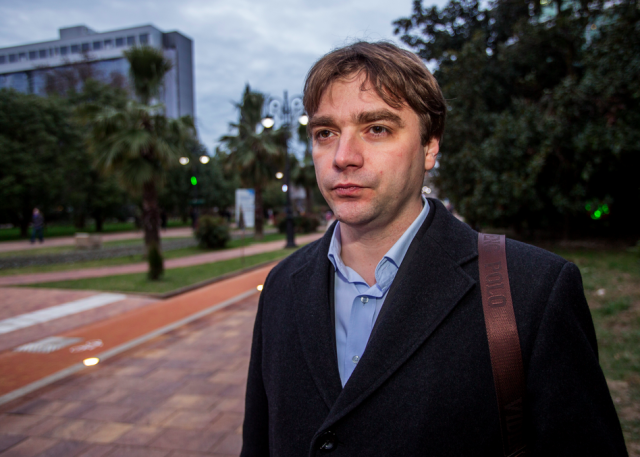
Chasing paper
Popkov told Bellona by telephone this morning that the new conditions of Vitishko’s incarceration were a “complete surprise” and represented “a fundamental change in his sentence,” which has left him and Dubrovina scratching their heads.
“We have absolutely no idea why or how this change came about and are trying to discern who ordered it,” said Popkov. “But it is evidently some machination of Russia’s security services,” he said, in reference to the Federal Security Service, or FSB – the KGB’s successor – which has been harassing EWNC activists incessantly.
According to Popkov, a judge issued an order nixing Vitishko’s brief return home before he turned himself over to prison colony officials, and ordered that he be transferred early in the day on February 18 to the remand jail in Krasnodar. Dubrovina today obtained proof of exactly that in her meeting with Vitishko.
Vitishko had been sent off to Krasnodar with both a copy of the original denial of his appeal as well as an added document signed by the judge stipulating that: “Because at the time of entry into force of the resolution to abolish his probation, Yevgeny Vitishko was already under arrest, so he should be escorted to the prison colony under guard.”
This order is entirely illegal, say both Dubrovina and EWNC activists, because such a decision cannot possibly be taken without the presence of Vitishko’s lawyers. Further, Russian law does not allow for decisions of appellate courts to be amended after they are handed down unless another hearing is called.
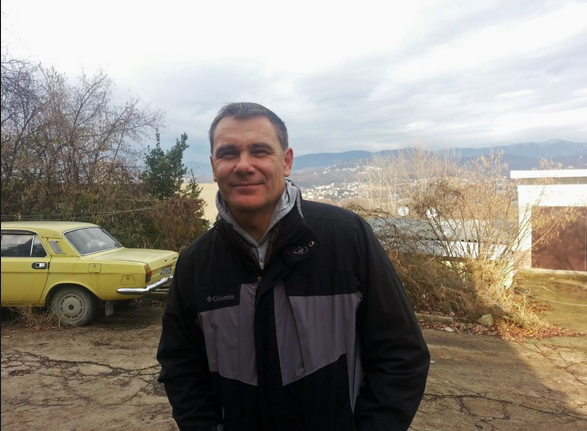
Because lines for lawyers and relatives wanting to visit inmates of Krasnodar’s overcrowded remand prison are several days long, Dubrovina was only today able to speak with her client about what happened, and to obtain copies of the decision that railroaded him into one of Russia’s most notorious remand prisons.
Bouncing Vitishko through the prison meat grinder
Vitishko’s sentence for “destruction of property” stems from a demonstration he and other EWNC activists held at a construction fence surrounding the no-longer secret mansion of Krasnodar Regional Governor Alexander Tkachev – known locally by his nickname “Sanya” – in 2012.
During the demonstration, someone – not Vitishko, according to activists and interviews he has had with Bellona and other media – spray painted “This is our Forest” and “Sanya is a thief.”
Vitishko and another EWNC activist, Suren Gazaryan – who has since received political asylum in Estonia – were initially each given probation and three-year suspended sentences for what became known locally as “the fence incident.” In December of 2013, the Tuapse court took up an appeal from Vitishko, who filed a complaint saying that the three-year suspended sentence was disproportionate for graffiti conviction.
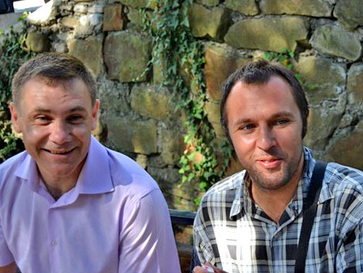
During the period of his suspended sentence, Vitishko told Bellona in his last interview before he was jailed, that he was under constant surveillance and that he was routinely stopped by police dozens of times a day.
On December 21, the Tuapse court turned down Vitishko’s appeal and imposed a three-year custodial sentence in a move Human Rights Watch, Amnesty International and Bellona called an open effort to stifle his protest of President Vladimir Putin’s prized Olympics.
Vitishko appealed the verdict and was allowed to remain free until his original appeal date of February 22 on the condition he not leave Tuapse without permission.
On February 3, Vitishko was picked up by police and rushed through a hearing, with no lawyer present, in which he was found guilty of swearing in public, on the evidence of two anonymous witnesses, and was immediately sentenced to 15-days administrative custody. He was due that day to travel to Sochi, with the authorities go-ahead, where he planned to speak to western journalists.
Shortly after he was locked up on the cussing accusation, his February 22 appeal date in the Krasnodar Regional court against his penal colony sentence was moved up to February 12, ensuring he would not be able to attend the hearing and speak in his own defense. Instead, he was hooked up to the Krasnodar court via a scratchy, nearly inaudible video connection from Tuapse.
His appeal was overturned after two minutes’ deliberation, and judge Andrei Konnov ordered that he serve the remainder of his public swearing sentence, and, after being turned free from the Tuapse jail, to see his family and turn himself over to penal colony authorities. As it turns out, Konnov was responsible for convening a secret court that issued the decision not to allow Vitishko to return home before the prison colony.
His supporters assert that the trumped-up swearing charge was an effort to keep him way from international journalists, and to hinder his work on a damning 84-page report (in Russian) on environmental destruction caused by the Sochi Olympics that was originally to have been released in Sochi on February 6, a day ahead of the Game’s opening ceremony. EWNC has said an English translation of the report will appear within a week of this writing.
What does this new detention mean?
Vitishko’s EWNC colleague Dmitry Shevchenko was today trying to read the tea leaves of this latest maneuver against the beleaguered organization, which has been the target of so much official wrath since Russia won the right to hold the Sochi Games in 2007.
Since November alone, there have been at least seven detentions of EWNC members, some of whom have been jailed for three to 15 days. Five activists were jailed over Russia’s sacred New Year’s holidays for driving within 10 kilometers of Tkachev’s fence.
In Shevchenko’s opinion, Vitishko’s current circumstances show evidence of winds blowing in many contradictory directions.
“It could be they are holding Vitishko until the end of the Olympics and then may turn him loose,” said Shevchenko. “Or it could be that they are holding him until the end of the Olympic to then send him to the prison colony during a time that it would receive little media attention. Or they may change his sentence all together.”
Shevchenko was also concerned about Vitishko’s health, and that cold that he caught in Tuapse’s drafty,unheated Bolshevik jail.
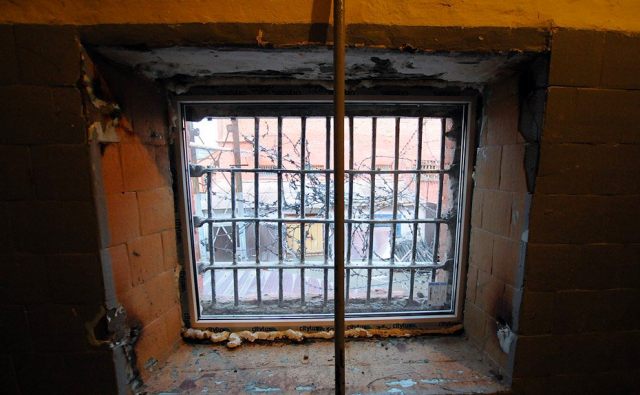
“It was built back then and essentially nothing has changed,” said Shevchenko, who noted he has had plenty of time over the past couple of years to spend time with Vitishko in that jail.
“It is a horrible jail with horrible conditions – there is no toilet, its cold, and people who are held there constantly get ill,” Shevchenko said. “And, Yevgeny was on a hunger strike, so we have to mind that his cold doesn’t get worse, though that will be hard to do.”
Support for Vitishko from Putin’s most vociferous enemies
On Tuesday, two members of Pussy Riot, the recently amnestied feminist punk collective, spoke out for Vitishko’s freedom while under arrest in Sochi.
Nadya Tolokonnikova and Masha Alyokhina, who had been serving two years in a penal colony for staging a 40-second-long “punk prayer” urging the Virgin Mary to “chase Putin out” in Moscow’s central cathedral in 2012, were in December freed by Putin in an move Tolokonnikova denounced as “cosmetic” and meant to distract from rights abuses taking place in the run up to Sochi.
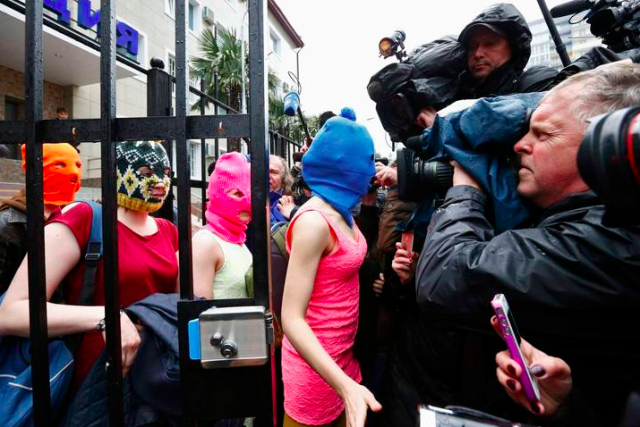
Speaking to Bellona from a police precinct in the Adler district of Sochi on Tuesday – the same day Vitishko’s jail transfer was to take place – Tolonkonnikov said her own detention reflected authorities’ desires to distract from coverage of the environmental activist.
“We have been here in Sochi for three days under constant surveillance, dealing with constant document checks. So why would we have been arrested today? The answer is simple … yes, definitely,” Pussy Riots detention was meant to draw the spotlight away from Vitishko while he was shoves down the rabbit hole, she told Bellona. She and her band mate Alyokhina were later freed without charge.
On Wedneday, Pussy Riot was brutally beaten by horsewhip and pepper-spray wielding Cosssack militiamen who are patrolling Sochi streets when the band attempted to perform their new song, “Putin Will Teach you how to Love the Motherland,” which the band dedicated to Vitishko and other political prisoners.
www.youtube.com/watch?v=eiw0fw_sJOk
The video of the savage attack on the women went viral through news services, primarily on the Kremlin-funded English language channel Russia Today. Author Masha Gessen commented that the video, with RT’s emblem on it, was an indication of the Kremlin’s open support for viciously beating protesters, and women in particular.
RT has since cleansed its own video of the incident from YouTube.
The International Olympic Committee’s spokesman Mark Adams, once again distanced the organization from protest sentiment, saying in a refrain heard often throughout the these Olympics whenever uncomfortable human rights questions emerge, that the horsewhipping of the women was not “Games-related,” the Associated Press reported.
Adams told AP that the IOC wants to know more details about the incident, but said it was”largely an issue for” the Russian government.
Given Pussy Riot’s high-profile support of Vitishko – whose incarceration and persecution Adams also says is not “Games-related” – the IOC’s anemicc response to the use of whips against Pussy Riot seems a forgone and consistently limp conclusion.
Pussy Riot’s Alyokhina again reiterated the band’s support for Vitishko and other of Russia’s political prisoners in an eloquent op-ed piece published in the New York Times yesterday.
“Environmentalists’ concerns about illegal construction, enabled by corrupt business dealings, are well founded,” she wrote, continuing: “When you talk about the Olympics — whether you like it or not — you are talking about Russia. For this is a country where people […] are sent to penal colonies, like the environmental activist Yevgeny Vitishko, for writing a slogan like “the forest is for everybody” on a governor’s fence, and where they may be sentenced to five or six years in prison for voicing their dissent against the status quo.”

Our November Nuclear Digest by Bellona’s Environmental Transparency Center is out now. Here’s a quick taste of just three nuclear issues arising in U...

For three years now, Bellona has continued its work in exile from Vilnius, sustaining and expanding its analysis despite war, repression, and the collapse of international cooperation with Russia in the environmental and nuclear fields

The Board of the Bellona Foundation has appointed former Minister of Climate and the Environment Sveinung Rotevatn as Managing Director of Bellona No...

Økokrim, Norway’s authority for investigating and prosecuting economic and environmental crime, has imposed a record fine on Equinor following a comp...